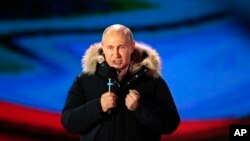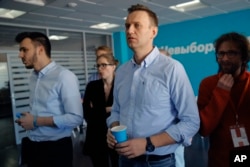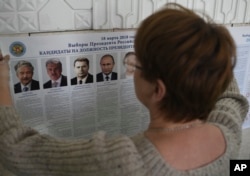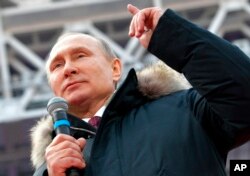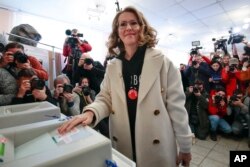Putin, who will serve another six-year-term bringing him just short of ruling Russia for as long as Communist dictator Joseph Stalin, didn't wait for the final tally and addressed supporters at a flag-waving anniversary rally off Moscow’s Red Square, marking Crimea's annexation by Russia four years ago.
Speaking from a stage to a cheering crowd, Putin said his victory was a recognition of what had been achieved in the past few years. "I see in this trust and hope, the hope of our people that we will work with the same intensity, with the same sense of responsibility and with even greater results," he added, before leading the crowd in a chant of "Russia, Russia!"
"Thank you for the fact that we have such a powerful, millions-strong team. Success awaits us."
Putin’s win over seven challengers will extend his time in office to nearly a quarter of a century, until 2024, by which time he will be 71 years-old. When asked by reporters if he will run again he laughed, saying, "What you are saying is a bit funny. Do you think that I will stay here until I'm 100 years old? No!" he said.
Russia’s Central Election Commission said Putin was on course to win 76.6 percent of the votes cast. Putin’s nearest rival, Communist candidate Pavel Grudinin, who was on course to secure 11.9 percent, told reporters Monday that the election was the "filthiest ever."
In his first reaction Alexei Navalny, the opposition leader barred from running, said he hadn't been able to contain his fury. "Now is the season of Lent. I took it upon myself never to get angry and not to raise my voice. Oh well, I'll try again next year," he tweeted.
There were reports of hundreds of ballot violations at polling stations across the country, which Russian election officials downplayed but said they were investigating. Ella Pamfilova, head of the election commission, said that there were no major violations during the vote, with only “minor and local complaints” received.
Asked by VOA what he thought about the poll’s conduct, a European Parliament election monitor responded: "I think the government achieved what it wanted."
Facing weak candidates — some likely encouraged to run by a Kremlin eager to give the election a veneer of competitiveness — Putin, who has held power since succeeding Boris Yeltsin in 1999, had always been guaranteed victory in an election timed to coincide with the fourth anniversary of the Russian annexation of Crimea.
Putin’s only credible challenger, blogger and activist Alexei Navalny, was barred from running because of a fraud conviction he said was designed to exclude him from electoral politics. Navalny and his supporters said Sunday voters had been bused in across Russia to the polls.
The deputy chairman of Russia’s Central Election Commission dismissed allegations of irregularities, tweeting: "There is not a single other country in the world that has the level of transparency that we are demonstrating today."
Nonetheless, activists posted videos online showing blatant violations. In a polling station in the republic of Sakha, an official is seen stuffing the ballot box, as genuine voters waited patiently in line to cast their votes. In Dagestan, an observer was beaten after refusing to stop filming ineligible voters. In another video, a young woman is seen stuffing a box while observers are distracted.
Some voters said they had been coerced into voting by factory bosses and had been told to photograph their ballot papers as evidence they had voted. Opposition monitors said they were finding stark differences in their turnout counts from the official ones, ranging from 12 to 25 percent in some towns and regions.
The big question as Russians headed to polling stations was: What percentage of the population would turn out to vote?
Kremlin officials clearly had been determined to produce an outsized vote for Putin as a demonstration of his legitimacy — and by lunchtime, seven hours before the polls closed, election officials projected the turnout would be 70 percent.
Kremlin insiders said before polling day the desired outcome would be 70/70 — 70 percent of the vote for Putin from a 70 percent turnout.
At 5 p.m. Moscow time, the Central Election Commission declared over half of all Russian adults had already voted, with authorities reporting a higher turnout than the last election in 2012.
Voters
Some analysts said the March 4 nerve-agent poisoning on British soil of former Russian spy Sergei Skripal, which the British blame on Russia, was timed to engineer a confrontation with the West and boost a patriotic turnout for Putin.
That suggestion was vehemently denied in the run-up to the polls by Putin aides, who said Russia was not involved in the nerve-agent attack. Some officials allege the British made up the incident.
Some voters had the rupture in Anglo-Russian relations on their minds. At a polling station at Moscow’s School 1520, private business owner Alexei said, “I think the British government has made all of the allegations up. I think that no one has poisoned Skripal. Our country hasn't poisoned anyone.”
Across from the school, police milled around to deter any flash protests, which had been promised in the capital but did not materialize. They stood outside the Barbershop School of Moscow with its marketing slogan, "Ideal Place for an Ideal Man."
Most voters encountered by VOA in Moscow said Putin was the ideal candidate. Some voters said they backed him because he had restored Russian strength, transforming the country from being a regional power to a global one.
Putin emphasized in the run-up to the polls that Russia’s power had been restored, notably in his annual state of the nation address in which he said the world was now forced to listen to Russia.
Other voters were focused on domestic issues, saying things had improved since the 1990s under Putin's leadership.
"Foreign policy is hard for me to understand, and I don't want to go into that," said Galiaya, a mother of two and a businesswoman at School 2123.
"We have voted for Putin," she said, including her 13-year-old daughter who stood smiling by her side. "At the moment, it seems he represents stability without anarchy. I am more afraid of anarchy, instability and war. I don't want either. I think he will stabilize the situation in the country, improve the economy and politics."
But not all voters were as enthusiastic at School 2123. Some who voted for Putin said they did so reluctantly because there was no real alternative. Others chose one of the alternatives.
"Of course, I voted for Sobchak," said a pensioner who declined to give his name. He was referring to 37-year-old Ksenia Sobchak, a former socialite and broadcaster, once famous for a raunchy reality television show. She was one of Putin’s seven electoral challengers.
"Let the young people start running the country. We don't want another war, and with Sobchak, there won't be a war," he said.
The pensioner said he didn't like the way some Russians referred to Putin as "father."
"I have never in my life pronounced the word ‘father.’ I was born in 1938, and my father was killed in 1942. I was three years old. I have never had a father."
He said he hoped Sobchak, who some Putin critics suspect was encouraged by the Russian president to run, would form a new party after the election.
Elsewhere, the independent monitoring group Golos said there had been reports of voters being pressured to vote. Several villages in Kamchatka and Chukotka reported turnouts of 100 percent. The group said it received more than 2,000 alleged violations, including claims ballot boxes had been positioned out of sight of observation cameras.
Sunday's election spanned 11 time zones, starting with the Far East, and ending with the Baltic enclave of Kaliningrad, where Friday police arrested several people for trying to organize election boycott rallies. There were other arrests reported in St. Petersburg and Sochi.
Nearly 109 million people were registered to cast ballots. State-owned polling company VCIOM projected a turnout of 71 percent. But the Russian nongovernmental research organization, Levada Center, conducted a survey in December that indicated 58 percent of voters planned to boycott the elections.
Casting his ballot in Moscow Sunday, Putin said "any" result that allowed him to continue as president would be a "success."
"I am sure the program I am offering is the right one," he told reporters.
Putin has been in power either as president or prime minister for more than 18 years. He switched between the two roles once to circumvent a law banning him from serving more than two consecutive terms as president.
Now, the question is: What will happen when his new term expires in six years? Will someone else take the helm, or will he change the constitution?
Some analysts say the uncertainty could trigger power struggles within the Kremlin, as possible successors jockey and maneuver against each other in case Putin decides to name a successor.




